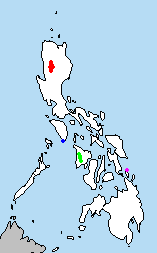Ilin Island cloudrunner
| Ilin Island cloudrunner | |
|---|---|

| |
| Scientific classification | |
| Domain: | Eukaryota |
| Kingdom: | Animalia |
| Phylum: | Chordata |
| Class: | Mammalia |
| Order: | Rodentia |
| Family: | Muridae |
| Genus: | Crateromys |
| Species: | C. paulus
|
| Binomial name | |
| Crateromys paulus | |

| |
| Range in dark blue | |
The Ilin Island cloudrunner (Crateromys paulus) is a cloud rat known from a single specimen purchased on Ilin Island in the Philippines. It is called siyang by the Taubuwid Mangyan.[2] It is a fluffy-coated, bushy-tailed rat and may have emerged from tree hollows at night to feed on fruits and leaves. The specimen, collected on 4 April 1953, was presented to the National Museum of Natural History in Washington D.C. The island's forests have been destroyed by human activity. The cloudrunner is among the 25 “most wanted lost” species that are the focus of Re:wild’s “Search for Lost Species” initiative.[3] As there in no proof that the single specimen originated on Ilin Island, searches are now focussed on nearby Mindoro. Hope that it may be rediscovered have prompted IUCN to improve its status from possibly Extinct (EX?) in 1994 to Critically Endangered (CR) in 1996 before the current Data Deficient (DD) from 2008.[1]
References
[edit]- Flannery, Tim F., and Peter Schouten. A gap in nature : discovering the world's extinct animals. Melbourne: Text Pub, 2001. Print.
- Musser, G. G. and M. D. Carleton. 2005. Superfamily Muroidea. pp. 894–1531 in Mammal Species of the World a Taxonomic and Geographic Reference. D. E. Wilson and D. M. Reeder eds. Johns Hopkins University Press, Baltimore.
- Specific
- ^ a b Gerrie, R. & Kennerley, R. (2017) [errata version of 2016 assessment]. "Crateromys paulus". IUCN Red List of Threatened Species. 2016: e.T5501A115071934. doi:10.2305/IUCN.UK.2016-3.RLTS.T5501A22415490.en.
- ^ Heaney, L. R.; Gonzales, P. C.; Cox, C. R.; Oliver, W. L. R. (January 1993). "Cloud rats in the Philippines — preliminary report on distribution and status". Oryx. 27 (1): 41–48. doi:10.1017/S0030605300023942. ISSN 0030-6053.
- ^ "The Search for Lost Species". Global Wildlife Conservation.

